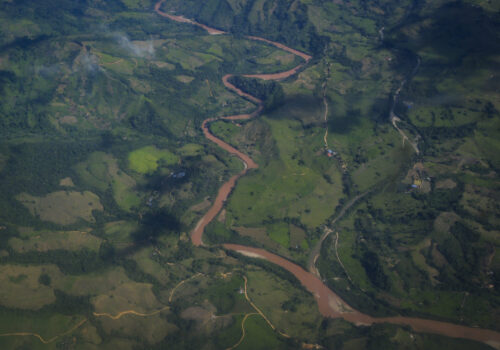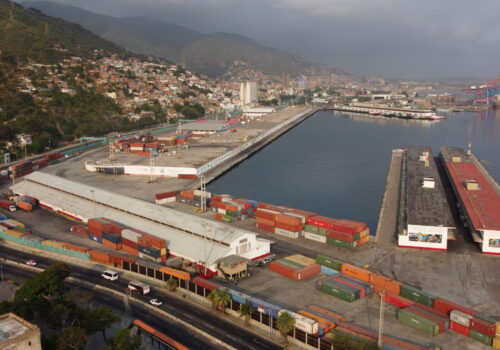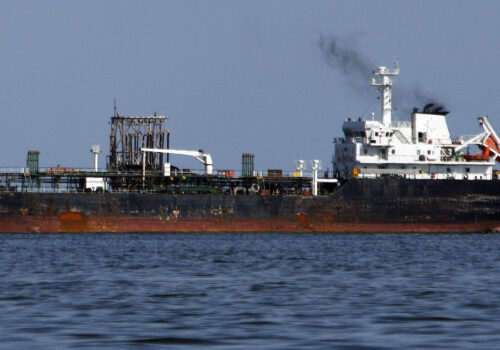Why are US warships heading toward Venezuela?
Set a course for the Caribbean. The United States has deployed three Aegis guided-missile destroyers and several other warships to the waters near Venezuela to counter maritime narcotics trafficking. US President Donald Trump has made curbing drug flows into the United States an administration priority. At the same time, the sizable US flotilla, which carries more than four thousand US sailors and Marines, has raised speculation about the threat it poses to Venezuelan strongman Nicolás Maduro. To steer us to answers on the important questions about this operation, two top Atlantic Council experts take the helm below.
1. Why is the Trump administration deploying warships to the southern Caribbean?
The United States is deploying a group of Navy warships and other vessels to the Caribbean due to Trump’s laser focus in going after transnational organized crime. It’s an action that has precedent, with Trump having deployed naval assets to the Caribbean in 2020, as well. This move coincides with the recent doubling of the reward (to fifty million dollars) for information leading to the arrest of Maduro for being “one of the largest narco-traffickers in the world.”
Additionally, the US Department of Justice has indicted the Venezuelan strongman for being the head of a drug trafficking network in the Venezuelan military, known as the “Cártel de los Soles.” Here, notably, when the Trump administration labeled the group a “terrorist organization” last month, it did not give it the same Foreign Terrorist Organization label as other drug cartels. Instead, it created a new class of individual sanctions that the Treasury Department could use to go after individuals associated with the network. Importantly, White House Press Secretary Karoline Leavitt reaffirmed on Thursday the degree to which the Venezuelan leader is a menace, noting, “Maduro is not a legitimate president. He is a fugitive head of this drug cartel.”
These actions are drawing renewed attention to the actions of the Maduro regime. At a time of competing global crises, his authoritarian regime has managed to deflect sustained international pressure for democratic change, maintaining an iron grip on power.
Just over a year ago, Maduro blatantly disregarded the results of Venezuela’s latest presidential election—an election in which opposition candidate Edmundo Gonzalez won more than twice as many votes according to vote tallies obtained by the democratic opposition—and earlier this year, he claimed an illegitimate mandate to remain in office.
—Jason Marczak is vice president and senior director at the Atlantic Council’s Adrienne Arsht Latin America Center.
2. Why should the world care about what’s happening in Venezuela?
Once a thriving democracy, Venezuela is mired in a yearslong crisis with regional and global implications. Political repression is prevalent and nearly eight million Venezuelans have fled Maduro’s regime. In this environment, armed groups and organized criminal structures, including drug trafficking groups, have thrived and benefited from a close relationship with authorities.
Maduro is not just a danger to the Venezuelan people but also to the broader region and the world. Maduro has violated Venezuelans’ fundamental right to elect their government, and has remained in power through a deepening campaign of repression against pro-democracy actors. A testament to this are current and former Venezuelan political prisoners and freed US hostages—the world should know about the abuses they faced at the hands of the Venezuelan government.
Each day under authoritarian rule is a day lost for the Venezuelan people. While there is no easy solution to decades of democratic erosion, recent developments—including an increased bounty placed on Maduro and the release of American hostages—offer a window of opportunity. Those who want to see Venezuelans free must remain committed to seizing this moment, and to standing with those fighting for freedom and democracy in Venezuela.
—Jason Marczak
3. What are the chances of this escalating into military conflict?
This deployment of naval assets is an important show of force, but it does not mean that the United States will engage in military strikes. This should be a warning to the regime to not detain Venezuelan politician María Corina Machado. Trump came to office promising to end wars, not start them.
This would fit with recent actions by Trump that seem to support engagement, including sending Special Envoy Richard Grenell to meet with Maduro in Caracas in late January. It would also explain why the United States continues to seek cooperation with the Maduro regime on deportation flights. There were nine deportation flights to Venezuela last month, and the vast majority of those flights were charter flights, paid for by the US government and sent directly from US Immigration and Customs Enforcement detention facilities in Texas, Florida, and elsewhere to Caracas. These flights would not be possible if there were not regular communication between Washington and Caracas.
—Geoff Ramsey is a senior fellow at the Atlantic Council’s Adrienne Arsht Latin America Center.
4. How is Maduro leveraging these developments?
Maduro and other Venezuelan officials have blasted the US operation as a mere psychological operation meant to spark regime change, while also noting that military intervention is unlikely. Maduro also announced the mobilization of the Bolivarian Militia, claiming millions of civilians are ready to take up arms even though observers have pointed out that many militiamen are simply pensioners or poor Venezuelans who participate in the program to receive government support. Maduro also ordered 15,000 Venezuelan troops to the Colombian border and imposed a nationwide ban on drone flights. Defense Minister Vladimir Padrino said that naval vessels will patrol Venezuela’s territorial waters, including routes vital to the country’s oil exports.
Ultimately, Maduro appears to be using this moment to rally domestic support while also trying to gin up support throughout the region. This past week, the government sent a letter to United Nations member states asking them to denounce the US operation as an escalation. Colombia, for its part, has responded by saying that the country received personal assurances from US representatives that military intervention in Venezuela is off the table.
—Geoff Ramsey
Further reading
Wed, Aug 6, 2025
How the US and Colombia can tackle crime, migration, and fallout from Venezuela’s crisis
Issue Brief By Lucie Kneip, Geoff Ramsey
Despite differences in priorities and political approaches, opportunities exist for the US and Colombia to coordinate policy that promotes stability in Venezuela and the broader region.
Thu, Jul 10, 2025
Two US policy options for Venezuela: Shaping reform vs. ‘maximum pressure’ toward regime collapse
Issue Brief By
The White House faces a choice: Should it use sanctions leverage to try to extract concessions from Nicolas Maduro on energy security, migration, and democratic reforms? Or should it bet on a return to “maximum pressure" in the hopes of precipitating a transition in Caracas?
Wed, Mar 26, 2025
An ‘America first’ approach to Venezuela is taking shape
New Atlanticist By Geoff Ramsey
US tariff threats against countries importing Venezuelan oil seem geared toward extracting concessions from strongman leader Nicolás Maduro.
Image: Arleigh Burke-class guided-missile destroyer USS Sampson (DDG 102) transits behind Nimitz-class aircraft carrier USS George Washington (CVN 73) while underway in the Pacific Ocean, June 26, 2024. George Washington is deployed as part of Southern Seas 2024 which seeks to enhance capability, improve interoperability, and strengthen maritime partnerships with countries throughout the U.S. Southern Command area of responsibility through joint, multinational, and interagency exchanges and cooperation. (U.S. Navy photo by Mass Communication Specialist 3rd Class August Y. Clawson)


